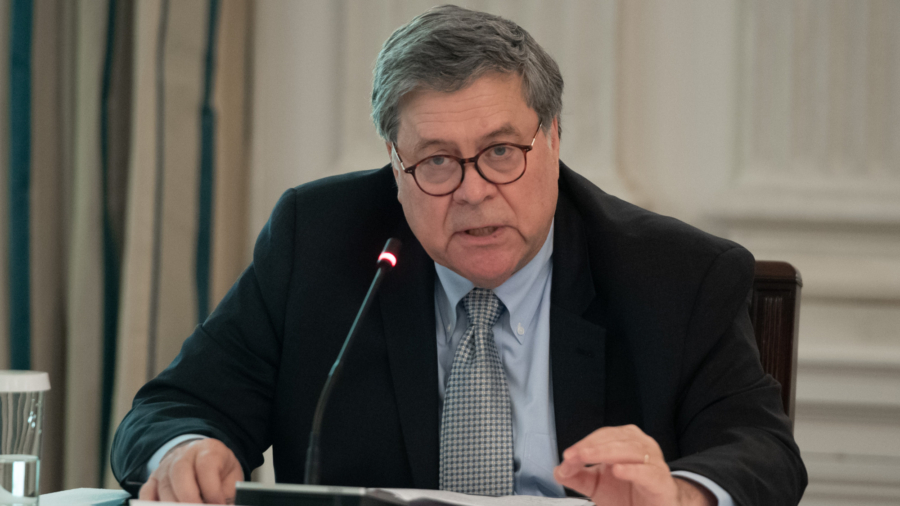Attorney General William Barr said Monday that he supports a prohibition on the use of chokeholds by police unless officers are confronted with “potentially lethal force.”
In a wide-ranging interview on Fox News’s “Special Report” with Bret Baier, the attorney general covered ground that included the movement to defund law enforcement and addressed what he called a “crisis in policing.”
Barr, at one point, was asked about his views on one aspect of police reform being called for, namely a ban on certain restraint techniques on grounds that they are inherently dangerous.
“I think we should ban chokeholds, lateral chokeholds … unless police officers are confronted with potentially lethal force,” Barr replied.
State and city governments in parts of the country have moved to impose chokehold bans.
Minneapolis city council voted last week to ban chokeholds and neck restraints like the one used against George Floyd, who died after an officer applied his knee to Floyd’s head and neck area for nearly 9 minutes.

The incident, which Barr called “ghastly,” sparked mass protests and led to mounting calls to overhaul police procedures, including to limit legal protections for police, create a national database of excessive-force encounters, and ban police chokeholds.
A rallying cry of some protesters and proponents of police reform is to “defund the police,” a many-hued movement that ranges from relatively moderate calls to adjust police budgets to fund the establishment of complementary community-based solutions, to extreme proposals to disband police departments entirely.
Activist group MPD150 says on its website that it is “working toward a police-free Minneapolis” gradually, describing the concept as being about “strategically reallocating resources, funding, and responsibility away from police and toward community-based models of safety, support, and prevention.”
Rep. Karen Bass (D-Calif.), chairwoman of the Congressional Black Caucus, said part of the movement is really about how money is spent.
“Now, I don’t believe that you should disband police departments,” she said in an interview with CNN. “But I do think that, in cities, in states, we need to look at how we are spending the resources and invest more in our communities.”
“Maybe this is an opportunity to re-envision public safety,” she added.
Defunding Police
Barr said in the interview he stands in opposition to efforts to disband police departments.
“I think it’s the exact opposite of the way we should go,” Barr said. “I understand given the history of racial injustice in this country why the African American community, or at least some of it, would view the ghastly events in Minneapolis as manifestations of institutional racism in police departments.”
“But I think in the past 50 or 60 years, we’ve had a lot of reform of police departments,” Barr said, adding that compared to his previous tenure as attorney general some 30 years ago, “I can tell you there’s a world of difference.”
He said there’s now a greater understanding of what drove the need for change both among police leadership and rank-and-file members on the force, “and there has been great change,” Barr insisted.
“Defunding police, holding the entire police structure responsible for the actions of certain officers is wrong,” Barr said, adding, “and I think it’s dangerous to demonize police.”
He made the point that it is unfair to judge entire police structures based on the horrid actions of several bad actors.
“None of us, as individuals, want to be lumped together with others. We want to be judged by what we do as individuals. We don’t want the misconduct of others attributed to us,” Barr said.
“One of the legitimate grievances of the African American community is that they’re treated with suspicion and braced simply because they’re African American. That does happen,” Barr said.
Barr extended this logic to protesters exercising their First Amendment rights peacefully, among whom there may be a few criminally-minded looters and vandals.
“By the same token, demonstrators, peaceful demonstrators shouldn’t be treated as violent extremists simply because they’re out on the streets,” Barr said. “It’s the same with police officers. Every organization has individuals who engage in misconduct and we have to be very careful before we say ‘the whole organization is rotten.'”
Barr acknowledged there is “a crisis in policing,” but said cutting police budgets would only make things worse because this would make it harder to attract and retain talented and responsible staff.
“You would have increases in vigilantism and you would have increasing chaos,” Barr said of what would happen if police departments were defunded.
He said moves that prevent the country from having strong and functional police departments are counterproductive.
“You’ll end up having more killings,” he said.
From The Epoch Times


